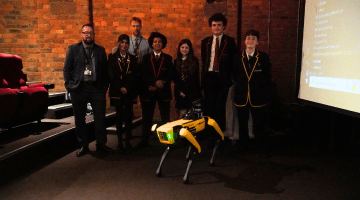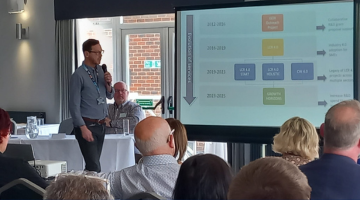Course modules
What you will study on this degree
Further guidance on modules
Modules are designated core or optional in accordance with professional body requirements, as applicable, and LJMU’s Academic Framework Regulations. Whilst you are required to study core modules, optional modules provide you with an element of choice. Their availability may vary and will be subject to meeting minimum student numbers.
Where changes to modules are necessary these will be communicated as appropriate.
Core modules
Engineering Mathematics
15 credits
15 credits
Electromechanical Energy Conversion
15 credits
15 credits
Circuit Theory
15 credits
15 credits
Digital Electronics
15 credits
15 credits
Analogue Electronics
15 credits
15 credits
Programming Concepts
15 credits
15 credits
Telecommunications Principles
15 credits
15 credits
Signals and Systems
15 credits
15 credits
Engineering Mathematics 1
10 credits
10 credits
This module develops your knowledge and understanding of the mathematics underpinning engineering. It develops your ability to apply these techniques within an engineering context. Laboratory sessions enable you to use and apply mathematical software to the solution of engineering mathematics problems.
Introduction to Electrical Engineering
20 credits
20 credits
This module aims to develop the students’ knowledge and understanding of basic principles of electrical engineering and applications.
Analogue Electronics and Electrical Circuits
20 credits
20 credits
This module aims to develop student's knowledge of DC, AC analysis with passive elements, construction, operation and applications of diodes and transistors, classes of amplifier, Op-Amp and filter circuits.
Digital Electronics
20 credits
20 credits
This module provides an introduction to Boolean Logic and the operation of combinational and sequential digital logic circuits.
Programming for Intelligent Systems
20 credits
20 credits
This module provides an introduction to Programming and the operation of programming in Engineering & IoT applications
Signals and Systems with AI
20 credits
20 credits
This module aim is to provide a good understanding of signals and systems with AI for practical applications.
Principles of Communications Systems
10 credits
10 credits
This module encompasses the main components of a communication system and their purpose by underlying the principles of communication systems. Further this module introduces the Signal transmission along with the communication mediums, channel characteristics, impairments, capacity/Bandwidths, communication methods and basics of modulation techniques supported calculations relevant to communications.
Core modules
Analytical Mathematics
15 credits
15 credits
Design Project
15 credits
15 credits
Control System
15 credits
15 credits
Digital System Design
15 credits
15 credits
Programmable Logic Controllers and Industrial Automation
15 credits
15 credits
Principles and Applications of Microcontrollers
15 credits
15 credits
Power System Analysis
15 credits
15 credits
Electrical Machines and Drives
15 credits
15 credits
Engineering Mathematics 2
10 credits
10 credits
The module is designed to extend the student's expertise in engineering mathematics to analyse the scientific and engineering problems. Specially, statistics, numerical methods matrix methods and series are studied.
Engineering Design Project
20 credits
20 credits
The module is designed to bring multi-disciplinary team to work together to allow students to gain the knowledge of multi-disciplinary skills of engineering. Therefore, the learners will be able to coordinate with individuals sharing knowledge and with strong team working skills. The students will work as a group with a minimum of three and a maximum of five.
Advanced Embedded Systems and VLSI Design
20 credits
20 credits
This modeule will provide learners with an understanding of the applications of microcontroller, PLDs and FPGA based systems and will develop the skills required to design, write and test software and interface such systems.
Instrumentation and Control Engineering
20 credits
20 credits
This module develops your understanding of components and the principles of control systems, basic design and analysis techniques, and practice some control applications.
Electrical Power System Design and Analysis
20 credits
20 credits
This module introduces to the power transmission, three phase symmetrical/unsymmetrical faults analysing/solving power quality, harmonic problems and electrical installation.
Electrical Machines and Drives
20 credits
20 credits
This module aims to develop your knowledge of transformers, three phase power generation, technological principles of operation of electrical machinery, electric motors and transformers, the steady state analysis, circuit modelling and analyzing electric machines’ performance and motor controlling unit. To provide knowledge in power electronic devices of IGBT, Thyristor and TRIAC, circuit operation and analysis of DC–DC converter, phase-controlled AC–DC converters and harmonics
Industrial Automation with PLC & SCADA
10 credits
10 credits
Fluid power applications and PLC architecture and applications acquired through lectures, and computer laboratory classes.
Basic electromechanical pneumatic and hydraulic system interface with PLC will be tested using laboratory.
Course tutors
-
 Subject Head
Subject Head
Tuition fees and funding
Entry requirements
Please choose your qualifications below to view requirements
Grades/points required from qualifications:
Work out how many UCAS points your qualifications are worth by visiting the UCAS Tariff Calculator.
Qualification requirements
Alternative qualifications considered
English language proficiency Grade C or above in GCSE Ordinary Level.
OR
IELTS 6.0 overall with no component below 5.5, taken within two years of the course start date
OR
ICBT Higher Diploma in English
Alternative qualifications considered
The HD suite of programmes at ICBT provides an excellent example of widening participation in a country where there is not enough University supply to fill the demand for higher education. Students can enter the HD programmes after studying for 13 years in the formal education sector through either having studied for A levels, or having undertaken the Foundation programme after studying for O levels. Other level 3 qualifications will also be considered for suitability for entry to the programmes. For the engineering programmes, students must have studied maths, biosciences and/or technology whereas for Quantity Surveying, any subjects will suffice. Students have been entering these programmes with these qualifications for many years and have been successful in achieving the qualifications.
Further information
-
DBS, Occupational Health requirements
The HD suite of programmes at ICBT provides an excellent example of widening participation in a country where there is not enough University supply to fill the demand for higher education. Students can enter the HD programmes after studying for 13 years in the formal education sector through either having studied for A levels, or having undertaken the Foundation programme after studying for O levels. Other level 3 qualifications will also be considered for suitability for entry to the programmes. For the engineering programmes, students must have studied maths, biosciences and/or technology whereas for Quantity Surveying, any subjects will suffice. Students have been entering these programmes with these qualifications for many years and have been successful in achieving the qualifications.
How to apply
Securing your place at LJMU
Your university life
From accommodation and academic support to clubs and societies. Find out what LJMU has to offer.
Related Links
Talk to our students
Connect with a current LJMU student for advice and guidance on university life, courses and more.
See what our students are saying
At LJMU we want you to know you're making the right choice by studying with us. You can see what our students are saying about their experience with us through their reviews on the following websites:
Related Links
News and views
Browse through the latest news and stories from the university










The university reserves the right to withdraw or make alterations to a course and facilities if necessary; this may be because such changes are deemed to be beneficial to students, are minor in nature and unlikely to impact negatively upon students or become necessary due to circumstances beyond the control of the university. Where this does happen, the university operates a policy of consultation, advice and support to all enrolled students affected by the proposed change to their course or module.
Further information on the terms and conditions of any offer made, our admissions policy and the complaints and appeals process.















